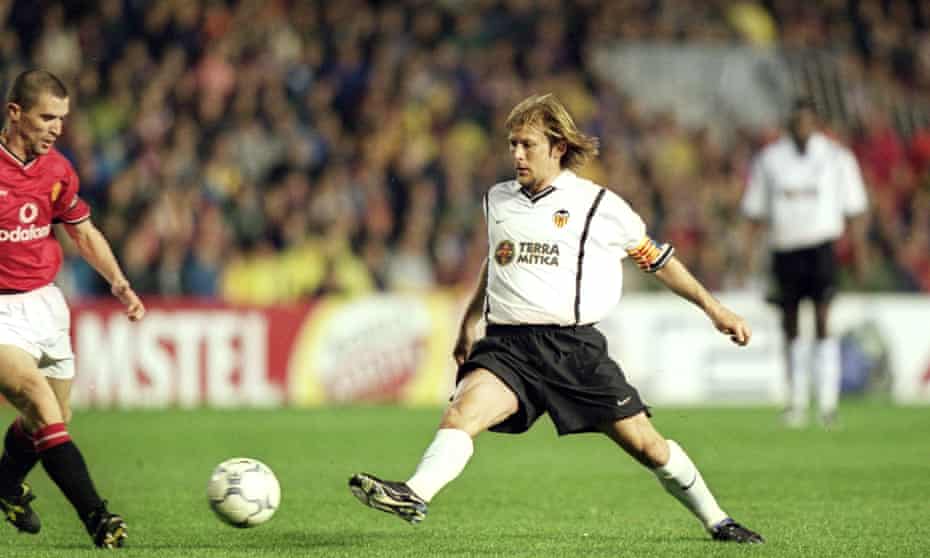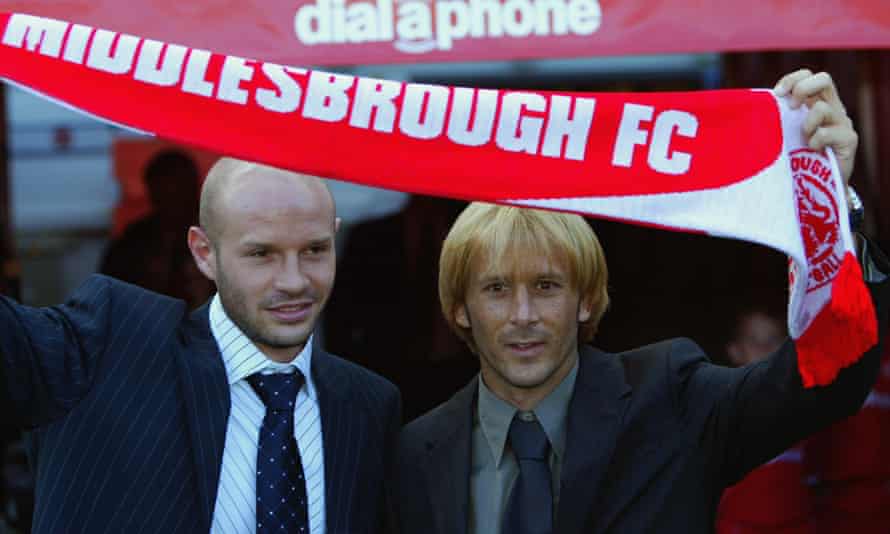It feels a little strange to start at the end with Gaizka Mendieta, but this is one that still smarts. The Spaniard, who was twice named the best midfielder in Europe by Uefa and captained Valencia to two unlikely Champions League finals, finished his career at Middlesbrough in less celebrated circumstances, as a knee injury and a falling out with Gareth Southgate dominated his final playing days.
“I did not see Southgate becoming England manager at all but now that he is, he’s a perfect fit,” says Mendieta. “We had a good relationship at Middlesbrough as teammates but when he became manager he still wanted to be a friend, a mate. But he wasn’t honest. Rather than just say, ‘We don’t want you here, find yourself another club’, he would keep telling me I was needed. We both knew it was not true; why did he tell me those things? He felt pressure from the board but later told me he would have done it differently.”
The transition between the end of a playing career and the start of a new one is something Mendieta deals with directly now, having recently launched Player 4 Player, a collective with Emile Heskey, Stiliyan Petrov, Michael Johnson and Gareth Farrelly that helps support current and former elite footballers on and off the pitch.
Mendieta, now a pundit, DJ and restaurant owner in England, is better placed than most to advise, even if his music has taken a back seat during the pandemic. “I have been DJing at home, just like everyone else, but doing lots of playlists for people,” he says with a smile.
Mendieta was in many ways a complete player, particularly for Valencia in the late 1990s and early 2000s. A trequartista and winger disguised in a No 6 shirt who would take just as much pleasure from making an interception to stop a counterattack as he would from curling in a free-kick or penalty; a bouncing, blond bundle of energy between both boxes who would out-run opponents, and out-train teammates.
That point is particularly important for Mendieta. Some of the best players look as if they were born with time and talent on the ball. Mendieta describes the most talented player he played with, Romário, as being “from another planet. I didn’t play with him for long at Valencia, but he was always three seconds ahead and so explosive, even though he was in his 30s.”
Quick Guide
The Guardian shortlisted for 12 SJA awards
The Guardian has received 12 nominations for the 2020 Sports Journalists' Association awards, with writers Andy Bull and Michael Aylwin both nominated twice. The virtual awards ceremony will take place on 15 March; more details can be found here.
Best sports newspaper
Cricket journalist Ali Martin
Football journalist Jonathan Liew
Rugby journalist Michael Aylwin; Rob Kitson
Sports feature writer Andy Bull; Hannah Jane Parkinson
Sports news reporter Ali Martin; David Conn
Sports scoop Haiti FA president accused of sexually abusing young female footballers - Ed Aarons, Romain Molina, Alex Cizmic; Rugby's dementia crisis - Andy Bull and Michael Aylwin
Away from the action (photography) Tom Jenkins
Mendieta was different: his was a talent earned and honed. When he arrived at Valencia as an 18-year-old in 1992 from struggling, second-tier CD Castellón – with his father Andrés (a former professional for Spain and Real Madrid) acting as his agent – his training performancesdisplays brought ridicule from his teammates. “He will not be playing for us for long,” an unnamed centre-back apparently smirked.
“Even though I covered a lot of ground and had a good positional sense, when I got the ball, I wasn’t bad, but I wasn’t what I became,” remembers Mendieta, whose late development could be attributed to “swapping football for athletics for a couple of years” as a youngster. “I would play simply, not try a 30-metre pass with the outside of my foot. But my teammates had other expectations, and so I had to improve.”

As ever with Mendieta, the late surge was well timed. Spanish football was undergoing something of a revolution, and just like the trim on the Valencia shirts, it was orange-tinted. Johan Cruyff had built the Dream Team at Barcelona that would win four La Liga titles in a row and a European Cup in 1992. At Valencia a young and moustached Guus Hiddink implemented his own Dutch mentality, with extra training sessions that would propel Mendieta from the reserves to the fringes of the first team. Of his own volition, Mendieta would stay later than anyone else.
By the time Claudio Ranieri arrived at Mestalla in 1997, Mendieta was established in the starting XI but still not at his peak. “Ranieri’s style suited me: pressing with intensity,” he says. “It was the first time he had coached outside of Italy and he tried to make us train at 3pm. I had to explain that was not going to work with our siesta. He and I talked a lot. The training was very ‘Italian’. A lot of weights, jumping, squats. We would ask him: ‘Claudio, remember that round thing over there?’ He adapted but so did we.”
By the end of the Ranieri’s second season in 1998-99, Valencia had qualified for the Champions League and won the Copa del Rey, with Mendieta scoring a screamer against Barcelona in the quarter-final and an outrageous chest-flick-and-volley in the final against Atlético Madrid, whom Ranieri would join that summer. The cup was Valencia’s first trophy in 20 years and is widely seen as a tipping point for the club, with the European success and La Liga titles that would follow.
Mendieta was one of the best players in the world between 1999 and 2001, captaining Valencia to Champions League finals in 2000 and 2001, against Real Madrid and Bayern Munich. A £29m move to Lazio in 2001 made Mendieta the sixth-most expensive player of all time, but things did not go well in Rome, despite some familiar faces – “I knew Iván de la Peña, Diego Simeone, Claudio López, Hernán Crespo, who helped me a lot”.
After an underwhelming season in Italy, and a season’s loan to Barcelona, Mendieta had a choice over his next destination, with Lazio’s financial issues mounting. Despite offers from Atlético and Athletic Bilbao, the Basque-born 29-year-old surprised all by opting for Middlesbrough, joining on loan in 2003 and permanently (on a free) a year later. Steve McClaren, previously enamoured of Mendieta’s performances against Manchester United and England, had been determined to get his man.
“McClaren came to Rome to sign me, to explain the project, why he wanted me, which made me feel very good. I knew [Alen] Boksic had been there and Juninho was there, but I didn’t know much about the club. I went there to see the facilities and signed. After being in Barcelona, Valencia, Rome, I knew where I was arriving. It was going to be a change. But Juninho was there, Bolo Zenden, Doriva, and they all spoke Spanish.”

Mendieta took to Boro straight away, and had an excellent first season before injury struck. There were fleeting moments of brilliance thereafter, including two goals against Manchester United in 2005, and he continued to live in the north-east after retiring before moving to London.
“McClaren was very good at man-management but training was very strange,” says Mendieta. “I said to him: ‘I need to train more. If I carry on like this, with the intense Christmas and January, I’m going to collapse.’ Not because of me, but that’s how the culture changed. It was partly led by the foreign players.
“Now, people call football players athletes. That wasn’t the case back then, even though the culture in Spain and Italy was far more professional than it was in England. There were still some players with a little bit of belly, skilful technical players that would try and get away with it.
“In Spain, we were lucky if we had time off in the week, and we would maybe get 25 days free in the summer. In England, I might get two days off per week, and one day ‘recovery’, plus I would get 45 days off in the summer. I was like, ‘what’s going on?!’”
from Football | The Guardian https://ift.tt/2ZWYVyw
via IFTTT

No Comment